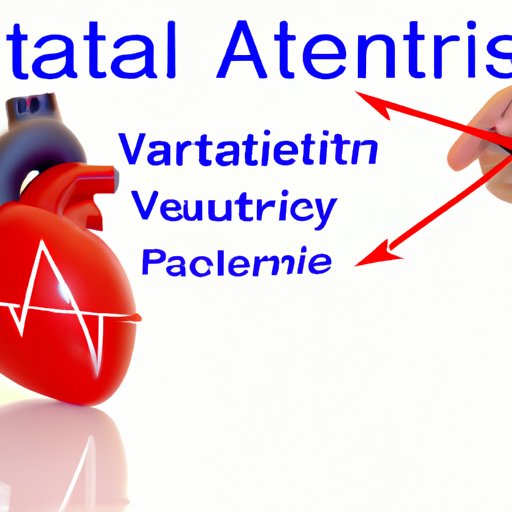Introduction
Cardiovascular fitness is a term used to describe the health of your heart and lungs and their ability to supply oxygen-rich blood to your body’s tissues. It is an important component of overall health and wellness, as it can help to prevent disease and improve physical and mental wellbeing. In this article, we will explore why cardiovascular fitness is so important and how it can benefit your health and wellness.

Examining the Relationship between Cardiovascular Fitness and Overall Health
Cardiovascular fitness is essential for maintaining overall health and wellness. Regular aerobic exercise, such as running, cycling, or swimming, can significantly improve your cardiovascular fitness and provide numerous physical and mental health benefits. Let’s take a closer look at the benefits of cardiovascular fitness.
Physical Health Benefits
One of the main benefits of cardiovascular fitness is improved physical health. Regular aerobic exercise can help to strengthen your heart and lungs, which can in turn reduce your risk of developing cardiovascular diseases such as coronary artery disease and stroke. Regular exercise can also help to reduce blood pressure, cholesterol levels, and inflammation, all of which can lead to improved heart health.
In addition to improved heart health, regular aerobic exercise can also help to strengthen your bones and muscles, which can help to protect against osteoporosis and other age-related conditions. Exercise can also improve your balance and coordination, reducing your risk of falls. Finally, regular aerobic exercise can help to improve your stamina, allowing you to stay active for longer periods of time.
Mental Health Benefits
Regular aerobic exercise can also have a significant impact on your mental health. Studies have shown that regular aerobic exercise can help to reduce stress and anxiety, improve sleep quality, and boost mood. Exercise can also help to increase your self-esteem and confidence, as well as improve your focus and concentration.
Exploring the Role of Cardiovascular Fitness in Weight Management
Cardiovascular fitness can also play an important role in weight management. Regular aerobic exercise can help to increase your metabolism and burn calories more efficiently, making it easier to lose weight. Additionally, exercise can help to reduce cravings and improve your appetite control, making it easier to maintain a healthy weight.
Benefits for Weight Loss
For those looking to lose weight, regular aerobic exercise can be especially beneficial. Not only does it burn calories and help to reduce body fat, but it can also help to reduce hunger hormones, such as ghrelin, and increase the release of endorphins, which can help to reduce food cravings. Additionally, regular aerobic exercise can help to reduce stress and improve your mood, both of which can help to make weight loss easier.
Benefits for Weight Maintenance
For those who are already at a healthy weight, regular aerobic exercise can help to maintain a healthy weight by increasing your metabolic rate and improving your appetite control. Additionally, regular aerobic exercise can help to reduce stress and improve your mood, which can help to reduce the risk of emotional eating and overeating.

Exploring the Impact of Cardiovascular Fitness on Mental Health
As mentioned above, regular aerobic exercise can have a significant impact on mental health. Exercise can help to reduce stress and anxiety, improve sleep quality, and boost mood. Exercise can also help to increase self-esteem and confidence, as well as improve focus and concentration.
Stress Reduction
Regular aerobic exercise can help to reduce stress and anxiety by releasing endorphins, which are natural stress-reducing hormones. Exercise can also help to reduce cortisol levels, which are hormones associated with stress. Additionally, regular aerobic exercise can help to reduce feelings of depression and other negative emotions.
Improved Mood
Regular aerobic exercise can also help to improve your mood by releasing endorphins, which are hormones associated with happiness and wellbeing. Exercise can also help to reduce stress and anxiety, which can help to improve your overall mood. Additionally, exercise can help to reduce symptoms of depression and other mental health disorders.
Discussing the Role of Cardiovascular Fitness in Age-Related Decline
Regular aerobic exercise can also help to reduce the risk of age-related decline. As we age, our bodies become less efficient at producing energy, which can lead to decreased strength, endurance, and mobility. Regular aerobic exercise can help to combat this by strengthening your heart and lungs, which can help to improve your overall energy levels.
Reduced Risk of Disease
In addition to improved energy levels, regular aerobic exercise can also help to reduce the risk of age-related diseases such as diabetes, heart disease, and stroke. Regular exercise can also help to reduce inflammation and improve cholesterol levels, both of which can help to reduce the risk of age-related disease.
Improved Cognitive Function
Regular aerobic exercise can also help to improve cognitive function. Studies have shown that regular aerobic exercise can help to improve memory and concentration, as well as reduce the risk of dementia and other age-related cognitive decline. Additionally, exercise can help to reduce stress and improve mood, both of which can help to improve overall cognitive function.
Conclusion
Cardiovascular fitness is an important component of overall health and wellness. Regular aerobic exercise can help to improve physical and mental health, reduce the risk of age-related decline, and contribute to weight management. From improved heart health to increased energy levels and improved cognitive function, the benefits of cardiovascular fitness are numerous. So, if you’re looking to improve your health and wellbeing, incorporating regular aerobic exercise into your routine is a great place to start.
(Note: Is this article not meeting your expectations? Do you have knowledge or insights to share? Unlock new opportunities and expand your reach by joining our authors team. Click Registration to join us and share your expertise with our readers.)
